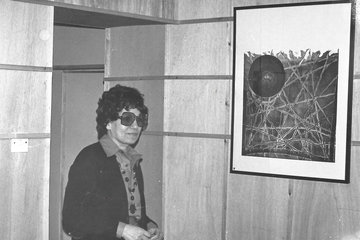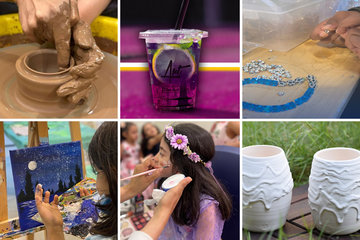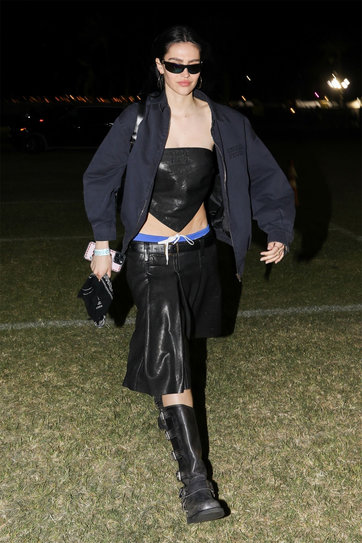Art & Books
The iPhone at 15, through pro photographers' eyes
This week marks 15 years since the iPhone first went on sale and ushered in a new era: the age of the smartphone.
It’s hard to imagine today how different mobile access was before that evening of June 29, 2007. The internet in your pocket didn’t look like, well, the internet. Social media — and the ability for everyone to respond globally to everything — was in its infancy. And while older phones certainly had cameras, the quality – and the potential for instant editing and filtering and sharing that exists today — wasn’t there yet.
The modern smartphone has changed photography. To capture a snapshot of that change, we asked more than a dozen Associated Press photographers across the world who use iPhones — some of the most talented journalists in the business — to capture an image on their phone and submit it.
Here is what they came up with. But first: Some words from Enric Martí, the AP deputy director of photography who oversaw the project — and who had his doubts about it at the outset.

ENRIC MARTÍ, New York:
You might call me a traditionalist. I’ve been a photographer for three decades and a photo editor for half that. I like negatives and the details they contain. I like physical things. I like full-on cameras. I liked the thought that went behind taking a 36-exposure roll of film and making tough choices about how to use each frame.
And phones — everywhere, every day, millions of images. There is so much photography, and so much fake photography. You can buy a 99-cent app that removes people from photos. That’s not photography to me; to me, photography is documenting what’s really in the world.
But I’m changing my mind about phone photography — sort of. I’ve been trying for a while now to see and feel the positive side of this technological evolution, so I am not perceived as a “dinosaur.” This project has helped me in that regard.
The photographers whose work is shown here are pros. Colleagues. People I admire. People whose images — from our “work” cameras — I see and edit all the time. But they are also people with phones, and with cameras in their phones, and that vision — the one they use so well in covering the news — comes out in very interesting ways. I asked them to observe things, and they did — each in a unique way.
In the end, I decided to add a photo of my own to this as well. Why not? I take them anyway, every day, on the street. I stopped carrying my “real” camera a long time ago, but I always have my phone. Which is kind of the point.
You go through life having to change. The world is moving quickly. You have to adapt. What else are you going to do?

YIRMIYAN ARTHUR, Kohima, India:
The phone is a tiny, constant companion that I rely on for moments that take me by surprise. You have to be quick to catch these fleeting moments. They may not return. My phone can sing you the life story of my children in pictures.
Yet a camera gives control that I don’t find possible on a phone. A lot of thought goes into building a narrative and expressing the idea embedded in the mind’s eye — even if, eventually, it is the eye behind the viewfinder. Catching the image of rain on a fast shutter would evoke a different feeling than seeing the image shot on a slow shutter speed. With a phone, I find it much harder to convert these ideas into images.
I use my phone on early morning runs, a time when the moon flirts with daybreak in my mountain town and the sky displays its glory. Even cloudy days aren’t dull here, and I’m thankful that I can capture such moments on my phone.
But this comes with a price. Instead of enjoying my front-row views, I’m looking into a screen. I feel increasingly dependent on this external memory keeper. It can feel intrusive. So I’m trying to convince myself to keep my phone in my pocket more, and just live the moment.

BRYNN ANDERSON, Atlanta:
Sometimes being a photographer with a larger camera can be intimidating to the person being photographed. Using a phone makes it easier for me to get intimate moments that might not happen. Being able to adjust the exposure to create dark shadows makes the iPhone my main camera in a pinch. If spot news occurs when I’m on vacation or out to dinner, I always have a quality camera to capture news.

WONG MAYE-E, New York:
The only time I don’t have my phone on me is when I am asleep, swimming or reading a book. It has become completely integrated in my life. Once, someone asked me how I separate life and my work (photography); when I thought hard about it, I realized that there was no separation because I photographed life.
I am a sentimental person. I love keeping memories. I photograph occasions in life that I want to remember; at work, I photograph life that happens for people. Sometimes it looks joyous and sometimes there is pain. The camera is just a tool that allows me to make snapshots of these moments. I have always done this with whatever camera that I have on me, and lately, while not at work, it has been my iPhone. I spend too much time staring at the screen, but because it’s right there in my hands at that moment, I find myself recording life in photos or video obsessively.
I own many cameras. I love all of them. But admittedly having the phone with me all the time, in its small unintrusive form, has allowed me to capture moments that don’t make anyone’s head turn. Right now, my phone album has 13,793 images on it. That is a lot of moments. It is, I guess, my visual diary.

NARIMAN EL-MOFTY, Cairo:
The iPhone’s camera has become more of a sketch pad and personal space of thoughts, ideas, and inspiration. It’s a place I can think of process for an upcoming story and keep this ongoing stream of thoughts visually with no judgement. It has this ease on the street because of its size and familiarity.
I felt like I was cheating when I used it for candid photos, and it never sat well with me. I like to manually control the whole camera to tell a story whilst physically being seen with the tool in my hand. People will then always have the right to react to me negatively or positively, and I‘m driven by that honesty.
Years ago, I had a heated conversation with an Egyptian policeman. He took my camera and said I was not allowed to take photographs of the streets of Cairo. The body of my SLR is a threat, seen as a weapon. I told him: That is the main reason I love having an SLR in my hand. There is a real interaction with the environment you’re photographing, a true reaction to you as a photojournalist on the ground. It is part of the skill set and the beauty of photojournalism. Rather than the idea of “stealing a picture” with my iPhone. I told the policeman I could’ve taken photos of him, and he would have never known. Governments have since caught up. Hence, if you’re detained and questioned, the first thing that is taken is the phone.

AARON FAVILA, Manila, Philippines:
The quality of the phone has become truly great in recent years. Now, I seldom bring a “real” camera during family trips. I have used the phone to shoot breaking news images so I can email them straight to the desk to be used as early photos for a story. I won’t replace it for professional work, but I’m confident that if something pops up in front of me, I can dig out the phone in my pocket and shoot pictures with good enough quality.

VADIM GHIRDA, Bucharest, Romania
This is a good example of an image that I couldn’t have taken on my camera. Most vendors and, frankly, most people in Romania get nervous if they realize a photojournalist is taking their picture even in the most mundane situations. It often leads to unpleasant interactions.
The smartphone, though, seems to be a magical stress-relief device. Even if people realize that you are a journalist, they no longer, in most situations, see you as a menace. They relate to you. In adverse situations, it can save the day.

DITA ALANGKARA, Jakarta, Indonesia:
Shooting with smartphones opens up more opportunities on the streets of Jakarta. People are so used to see others taking photos with their gadgets that they just ignore me. This gives me a whole new perspective to explore and easily get me to the nooks and crannies of a city of 10 million people — a place where a “real camera” would feel awkward to operate.

DAR YASIN, New Delhi
The photos now shot on the latest phones feel like digital art more than photographs. What you see with the naked eye is not what you get on your screen. And that for me is very unsettling. For example, the colors are oversaturated and look “touched up” when I have done nothing but pressed the shutter. The portrait mode produces blur but it’s not the same effect my regular camera gives me. These pictures definitely don’t evoke a similar thrill of a taking a good picture.
I’ll admit that there are instances when I love the pictures taken on my iPhone. There is no denying the phone captures those moments very well indeed. But it’s important to realize: The “pro” label on a phone doesn’t necessarily make every owner a pro photographer.
On the contrary. The photographs on a smartphone are a product of machine learning, with the machine thinking and manipulating for you. It is also true that the iPhone is kind of setting a new ‘standard’ of what a photograph should look like — and I’m not sure that’s a good thing.

KHALIL HAMRA, Istanbul, Turkey
I used my iPhone to take this picture, which is what I do when I see a beautiful view and I am not carrying professional cameras. But I mostly use the iPhone camera to capture family memories. In all cases, the use of the phone does not eliminate the need for professional cameras, neither in the beauty of the picture nor in the pleasure of capturing it.
Truth be told, every time I take a nice picture with my phone, I feel that something is missing and could have been better if I took it with my professional camera.

ARIANA CUBILLOS, Caracas, Venezuela
I do love taking pictures of my daughter and my pets with the phone and filters. Also, I take pictures with it when something grabs my attention and my cameras are packed in my bag. It helps me to remember the spot. It is an easy, light and fast tool.
Does the smartphone give you a different perspective? For me, totally. At the moment I take a picture, it feels flat on the screen. It is not the same as taking a picture looking through the viewfinder of a full camera, controlling light exposition and speed at the same time you take the photo.

EMILIO MORENATTI, Barcelona, Spain
For me, the use of the phone camera is just an alternative to my conventional camera, so I only use it on rare occasions and basically to photograph or capture on video family scenes or scenes with friends, with the simple idea of documenting banal moments.
Shooting with a camera is much more serious, and the result differs dramatically from shooting with a phone. Composing and capturing a scene through a viewfinder while pressing a shutter release is part of the essence of photography, and you can’t do that with a phone yet. The flat image that a phone gives you can’t compete with the photography you get from an SLR camera and a good lens, no matter how much phone photography lovers say otherwise.

NATACHA PISARENKO, Buenos Aires, Argentina
I use an iPhone instead of a camera on diverse occasions.
Sometimes it’s as a reflex, when I see something I want to keep at that moment during my daily life. Sometimes it’s just that I don’t have a camera at hand, even though I’d want to. Sometimes I use the phone camera when I want to send an image immediately by message or WhatsApp — a way to communicate something to someone through an image and no words. Sometimes it’s just something I want to keep.
The irony: My phone is so full that at the end, I scroll down the pictures erasing everything that does not mean that much to me. That way, I can keep using it as a camera or video recorder — and then erase it again.

RODRIGO ABD, Buenos Aires, Argentina:
The phone allows me to practice street photography, a branch of photography that I like because it allows me to always be attentive to the everyday without a precise news event to cover, and with only the intention of documenting the most banal moments of life. But at the end of the road will be a record of a vital moment in the life of society.

FELIPE DANA, Barcelona, Spain
Being a photojournalist, I try to always carry my professional camera with me in case I come across a nice scene or any breaking news. For a long time I considered the camera on my phone only usable in cases of emergency, when you really have no other option. But ever since the first iPhone appeared 15 years ago, phone cameras have come such a long way that I admit feeling a bit less anxious knowing that I always have a very capable camera in my pocket.
I will still always pick my professional camera when going on any assignment. But nowadays the photos taken with smartphones are becoming harder and harder to distinguish from those captured on pro devices.

J. DAVID AKE, director of photography, New York:
The iPhone makes it really easy, when I spot something I want to share with my family, to just reach into my pocket, grab the phone and make a frame. I still carry a professional high-resolution camera most places, but the ease of the iPhone to snap and share via text message means my family and friends get see what I see at almost the moment I see it.
When you travel a lot and are away more than you like, that instant connection matters.





























